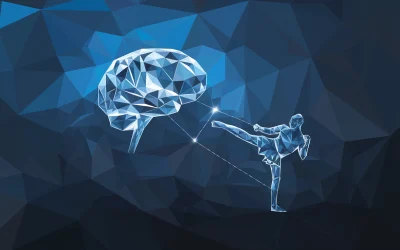Motivation is perhaps the single most important factor in developing high level martial arts skills. Those who are intensely driven may train up to 8 hours a day, 10 days a week. In contrast, those lacking motivation may not even train 10 hours per week. There is a direct correlation between motivation level and training time and intensity. So what drives such motivation? Passion for the craft provides the fuel and sense of deeper purpose necessary to sustain extensive practice.
Cultivating passion involves connecting to the satisfaction and meaning martial arts provides. It stems from a “fire in the belly” that energizes rigorous exertion. Passion transcends enjoyment – it is about deriving a profound sense of existential fulfillment from the endeavor. Without passion, motivation slides into tedium and drudgery. Setbacks feel discouraging rather than instructive. Progress stagnates.
Those serious about achieving excellence must nourish passion through activities like reading inspirational books, watching motivational videos, surrounding themselves with like-minded individuals, and reminding themselves of their purpose. Passion supplies the spark for lighting the flames of motivation. As motivation grows, training becomes a self-reinforcing cycle – progress stokes passion which further raises motivation.
Make nurturing passion a daily practice. Reflect on your motivations and connect to your deepest martial aspirations. Allow this passion to inform small choices that collectively build into unstoppable motivation and remarkable achievement.
Learning Through Observation Trumps Instruction
In an era of unprecedented access to instructional materials, there is no shortage of books, videos, seminars and classes marketing shortcuts to expertise. However, taking in more content does not necessarily translate to more proficiency. Information alone is insufficient absent direct experience. At best, instruction provides a broad framework for orienting training. But cultivating nuanced physical competence requires deep intuitive familiarity that no teacher can impart. As the old saying goes, “The eye cannot teach the hand.”
The limitations of verbal coaching are most apparent at advanced levels. Once basics are established, technical refinement involves mastering subtle movement patterns difficult to articulate explicitly. The most expedient path for internalizing these intricacies is through careful observation of those at the highest echelons of excellence. By intently studying their techniques, footwork, hand positioning, head movement and body mechanics, one can gather insights to inform their training.
Choose an exemplary practitioner and dedicate time to closely analyzing their attributes from different angles. Adopt their style temporarily, immersing yourself in their rhythms and motions. Experiment with integrating observed techniques into your skillset in ways that complement your abilities. Approaching learning through mindful mimicry allows you to pick up critical nuances not discernible through instruction alone. With time and experience, you will intuit which high-level approaches to incorporate and how to adapt them synergistically.
Cultivating Beginner’s Mind for Continuous Growth
Some martial arts schools preach rigid adherence to fixed techniques and principles. This traditionalist mindset aims to preserve institutional authority and continuity of instruction. However, insisting techniques conform to prescribed ideals can constrain creative evolution. Defining the perfect punch or kick implies these motions have an objective Platonic form that can be mastered. But in reality, martial excellence requires fluid adaptability, not rote replicability.
Rather than seeking perfection in technique, adopt a beginner’s mind orientation. This involves embracing continuous learning without assumptions that you have all the answers. Imagine you are a white belt again, viewing skills and knowledge impartially, without ego or pretense. Question, experiment and explore possibilities with curiosity and humility. Consider each session an opportunity to refine your practice, not definitively master it.
Beginner’s mind also entails avoiding fixed mental models that filter perception. Open yourself to varied interpretations, perspectives and applications. Remain receptive to unconventional insights that spur innovation. The most profound revelations often stem from unexpected sources seemingly irrelevant to martial arts. By dropping preconceptions, you ready yourself to capitalize on serendipity.
Adopting beginner’s mind allows you to escape rigid patterns holding back your development. Freed from artificial constraints, you retain flexibility to evolve your practice according to emerging challenges and insights. This mindset powers continuous self-transcendence across the lifelong journey of martial arts excellence.
Building Understanding Piece by Piece
Developing expertise is not an overnight process, but the result of gradually acquired comprehension over years of experience. Do not get frustrated comparing yourself to masters who have practiced for decades. Appreciate you are at the early stages of constructing a foundation. Through repetitious training focused on incremental improvements, disconnected ideas slowly coalesce into integrated understanding.
Think of progress like assembling a jigsaw puzzle – you must patiently fit together distinct pieces until the full picture emerges. At first, fragments of insight make little sense, but eventually important connections unite them into cohesive knowledge supporting skill development. Trust the process of connecting dots between various practices and concepts.
What provides illumination for one practitioner may differ from others based on aptitudes, affinities and prior knowledge. For some, a principle from Eastern philosophy might prove enlightening, while for others, insights from biomechanics research could be revelatory. There is no uniform formula. Have faith that persistently mining broad resources while immersing yourself in rigorous challenges will confer understanding over time. The next vital piece of the puzzle could be just around the corner.
Training With Purpose, Not Prescription
Instructors naturally want to provide clarity for students by prescribing techniques. However, while foundational coaching can impart helpful guidelines, strictly following prescribed methods overemphasizes mimicry versus cultivating an intuitive feel for effectiveness. You cannot attain excellence solely through imitation without a nuanced experiential grasp. Therefore, avoid rigidly adhering to conventions without ongoing validation they align with your goals and abilities.
Rather than simply parroting techniques, strive to discern their underlying essence so you can adapt them intelligently. Extract principles selectively, assimilating those most resonant and relevant. Integrate these purposefully into your existing skillset, refining application through extensive training guided by your aims. Adopt a pick and choose mentality around integrating external guidance.
Training is about much more than amassing isolated techniques – it requires synthesizing disparate practices into unified expression. Seek not to perfectly perform textbook methods, but to understand the deeper synergies empowering high level performance. Dedicate yourself to mindful, purpose-driven training focused on continual refinement rather than checking boxes on conventional standards. This self-reliant immersion focused on growth will illuminate your unique path to mastery.
Key Principles for Developing Martial Arts Excellence
- Motivation stems from passion for the deeper purpose martial arts provides. Nurturing passion is essential for fueling serious training.
- Observing top performers intently can reveal subtleties impossible to articulate verbally. Studying masters accelerates learning.
- Adopt beginner’s mind to avoid rigid assumptions that limit potential growth and innovation. Embrace continuous learning with humility and curiosity.
- Progress requires patiently accumulating insights over extensive training until integrated understanding emerges. Trust the gradual construction process.
- Absorb techniques selectively based on alignment with your abilities and aims. Adapt methods purposefully rather than blindly imitating.
By grounding yourself in these core principles, you pave a unique path to excellence driven by your passions and capabilities rather than external standards. Prioritise commitment and keep your gaze on the ultimate goal of your martial journey. With unwavering dedication and step-by-step growth, distant goals come within grasp. Remember, mastery isn’t a final destination but an ongoing journey filled with endless opportunities for growth. And if you’re keen on embracing this journey from the foundation, Apex MMA in Brookvale offers a starting point. Experience how the principles discussed are seamlessly incorporated into our training modules. Sign up for one of our beginner classes and benefit from a free 7-day trial.





0 Comments